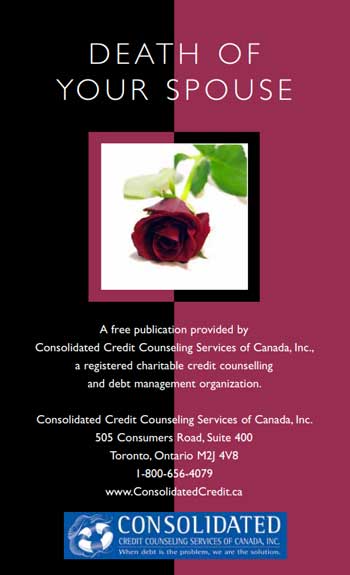Do you know what debts are forgiven at death? As the saying goes, there are two things certain in life: death and taxes. But does mean that your debts follow you to the grave or might your loved ones be on the hook?
In this article, we’ll look at your personal finances and death. We’ll examine whether you can inherit debt, what happens to credit card debt when a loved one passes away, and debts that are forgiven upon death.
Can I inherit debt?
If an immediate family member, such as your parent, sister or brother passes away, you may be curious if you automatically inherit those debts as their relative or next of kin. The simple answer is no, you don’t inherit a family member’s debt in most cases. Debts are not transferable between people upon the borrower’s death. (The only exception is if you hold the debt jointly with the deceased person or you’re a co-signer.)
That won’t stop creditors and collectors from trying to recover money. These creditors may claim that you’rce legally responsible for paying back the debt, but that’s false in most cases. That’s why it’s important to know your rights. If you don’t know your rights, you may think you’re responsible for the debt. Do not pay back a creditor if it’s not a requirement.
If you’re the next of kin and a loved one passes away, the estate will be obligated to pay debts. That means that you may not receive as much as you were expecting from the estate of a loved one.
Your Credit Card Debt
If you’re like most Canadians you’ll have some debts when you pass away. You may not have a mortgage or car loan, but it’s fairly common to have credit card debt after death. Even if you’re in the good habit of paying off your credit card debt every month, if you’ve charged items on your credit card and haven’t had a chance to pay them off when you die, that’s when there can be a balance owing.
Paying off credit card debt when you die is pretty simple. Of course, you won’t be able to pay it off yourself, since you’re now a deceased person. Instead, your estate will handle it for you. Creditors will want to receive a copy of your death certificate to prove that you indeed did pass away.
Once they confirm your passing, it’s time for your estate to pay off your debt. The assets of your estate will go towards paying any debts owed to creditors. That includes credit card debt. Examples of assets include your home, savings and investments. These assets must go towards settling your debts before your beneficiaries will ever see a dime.
Let’s say you don’t have any assets when you pass away. What happens in this instance? Debt collection is a little more complicated here, as in creditors won’t be able to collect any money that’s owing to them if you don’t have any assets upon death. That means that your credit card debt magically disappears if that’s the case.
What Creditors Should Know
Creditors should be fully aware that credit card debt isn’t collectible if you pass away without any assets. That won’t stop credit card companies from trying to collect the debt anyway.
Creditors could try to pressure your surviving spouse and loved ones to pay off your debt. Creditors can sometimes even threaten to take legal action against your loved ones, especially when there’s a lot of money at stake.
If your loved ones feel like a credit card company is harassing them about your debts after your passing, they can file a complaint with the consumer affairs office in their home province or territory.
When Your Loved Ones Might be Responsible for Paying Your Credit Card Debt
There is an instance when your loved ones might be responsible for paying back your credit card debt.
If a loved one is simply an authorized user on your credit card then they shouldn’t be responsible for paying back any debt owing from their own pockets upon your death. However, if you live in one of the community property states, your spouse may be responsible for repaying your credit card debt as the debts are shared.
It becomes even more confusing with a supplementary credit card. Sometimes your loved ones can be responsible for repaying credit card debt if they have a supplementary card of one of your credit cards. Other times they aren’t responsible at all.
Supplementary credit cards may be convenient, but as you can see there’s a risk. That’s why you might think twice before accepting one from a loved one. You wouldn’t want to be on the hook for all their debts if they were to suddenly pass away.
Death of Your Spouse
Losing a spouse is a very stressful event and usually the last thing on a person’s mind is getting their financial situation organized. This can be an overwhelming task, especially if the spouse who has passed on did not keep an organized record of his or her financial affairs.
A Spouse’s Debt
Simply put, your spouse’s debt is non-transferable to you upon your spouse’s passing. However, it can be your responsibility if the debt is joint or you co-signed. In a situation like that, you could be held responsible for the debt and it could affect your credit report.
For example, it’s fairly common to have joint credit cards between spouses. This is a convenient way to combine your finances and reward points as well. But this can come at a cost. You could be responsible for your spouse’s credit card debt on a joint credit card. If there isn’t enough money left from the estate, that’s when you might be forced to pay for it out of pocket.
Debts that are Forgiven Upon Debt
There really isn’t a list of debts to reference. Basically, any debts you have in your own name are your responsibility and your responsibility only. That means credit cards, student loans, lines of credit and mortgages would all be your responsibility to pay back.
Debts are forgiven if you don’t have enough assets to repay these debts. Before a creditor will give up collecting money that’s owing from your estate, they’ll almost always want to see proof. Once the creditor sees there aren’t enough assets to pay for the debt, they may give up trying to collect.
Conclusion
Would you prefer to discuss what debts are forgiven at death with someone? Are you looking to get your financial house in order so that you don’t leave a mess for loved ones? Call us today for a free debt consultation.






